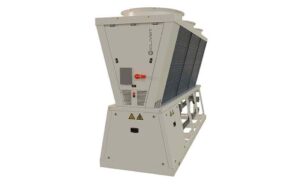Linking chemical know-how to hvac efficiency
20th February 2015 USA: Johnson Controls is planning to tap into knowledge gained from the chemical industry to develop more efficient commercial hvac control systems.
USA: Johnson Controls is planning to tap into knowledge gained from the chemical industry to develop more efficient commercial hvac control systems.
In a pioneering partnership with chemical engineers at the University of Wisconsin-Madison, Johnson Controls aims to harness the optimisation techniques used extensively in chemical plants to develop control algorithms for more efficient commercial hvac systems.
The project — which is being tested at various sites, including the Johnson Controls building in Milwaukee and buildings on the Stanford University campus — will serve as a foundation for advancing hvac control systems in general.
The research group led by Jim Rawlings, the Paul A Elfers professor and W Harmon Ray professor of chemical and biological engineering, is seeking to develop algorithms that will enable building managers to harness a broad range of data to run their hvac systems more efficiently.
“Building managers haven’t always had much data to inform decisions about heating and cooling,” says Rawlings, “but in recent years, it’s become easier to acquire the kind of data that work well for chemical engineering-related control processes. These data include energy pricing, weather forecasts, worker hours and the impacts of other potential heat sources in a building.”
However, despite the availability of data, the team maintains that there is still no standard way to put together an hvac system for a large building, and even within one building, that system might be composed of many disparate pieces of equipment and several different software control systems. The team insists that to analyse and control the system as a whole — or optimise heating and cooling across an entire campus of buildings — the control framework has to be agnostic to the size and makeup of the system.
The UW-Madison researchers are using a process-control method called model predictive control, which involves forecasting the future behaviour of a system and taking those forecasts into account to make real-time adjustments.
“In the chemical industry, optimisation has been a much more important part in the operation of chemical plants, because that’s your profitability, that’s the goal of the business,” Rawlings says. “So what the hvac industry is able to do now is take advantage of all that development over the last 20 or 30 years in the chemical industry and bring it over to buildings.”
As the optimisation algorithms pass through different revisions and iterations, Rawlings and his group gain an increasingly nuanced understanding of the real-world contexts in which their ideas are used. “You know how the building is running and you can look at how it ran a year ago, two years ago, 10 years ago, and you can detect things like equipment that is degrading, and you can find out what the use patterns are,” Rawlings says. “You can find out that over time, energy use in this building is rising or dropping, and you can start to ask what-if questions.”
Robert Turney, a Johnson Controls engineer and technical lead on the project, says the work is driven by client interest in cutting costs while implementing lofty goals for energy efficiency. He credits the UW-Madison researchers with helping the controls industry seize on new possibilities.
“I count on the university to be the pioneer in solving HVAC problems in new and innovative ways,” says Turney. “It’s an infusion of high-tech into a low-tech space.”







